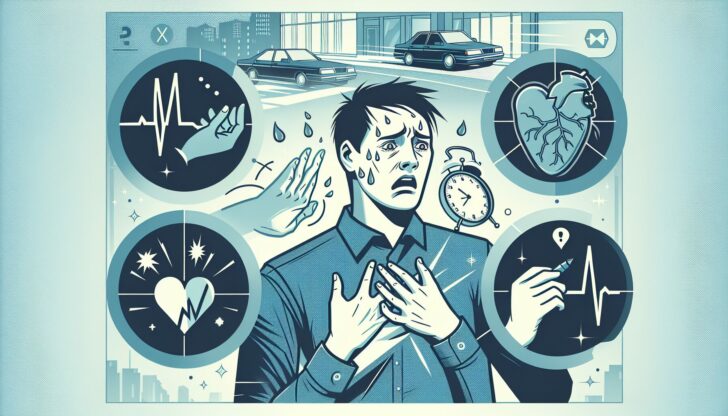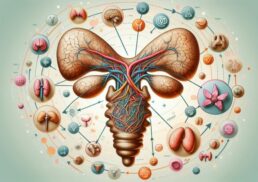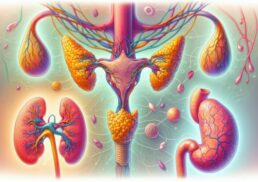Recognizing cardiac disorder symptoms early can save lives. Common symptoms include chest pain, shortness of breath, and fatigue. This guide will help you understand what these symptoms mean and when to seek medical help.
Table of Contents
Key Takeaways
Recognizing symptoms such as chest pain, shortness of breath, and fatigue is crucial for the early detection of cardiovascular diseases, allowing for timely intervention.
Specific symptoms vary by cardiac disorder type, with conditions like coronary artery disease and heart valve disease presenting unique indicators that necessitate immediate medical attention.
Lifestyle modifications, including quitting smoking, adopting a healthy diet, regular exercise, and effective stress management, are essential for improving heart health and managing symptoms of cardiovascular diseases.
Recognizing Cardiac Disorder Symptoms

Cardiovascular disease (CVD) includes various conditions that impact the heart. It also affects the blood vessels. Symptoms such as chest pain, shortness of breath, and fatigue are common indicators of potential cardiac issues. Early recognition of these symptoms allows for timely treatment and improved health outcomes.
Regular cardiovascular screenings can detect cardiovascular disease before it becomes severe. Here is a detailed breakdown of the symptoms and their significance.
Chest Pain and Discomfort
Chest pain is often the most recognizable symptom of heart disease. It can manifest as:
pressure
squeezing
fullness
pain in the center of the chest
This pain can sometimes feel like an elephant sitting on the chest or a burning sensation. Such discomfort might indicate coronary artery disease or even a heart attack. Severe chest pain lasting more than a few minutes warrants immediate medical attention.
Moreover, chest pain accompanied by lightheadedness could signal heart valve disease.
Shortness of Breath
Shortness of breath, whether at rest or during physical activity, is a key symptom of heart disease. It can indicate issues such as cardiomyopathy, where the heart’s ability to pump blood is compromised. Individuals may notice breathlessness during daily activities or even at rest.
Coupled with chest pain or extreme fatigue, shortness of breath is a strong indicator of potential heart failure or other cardiovascular conditions.
Fatigue and Weakness
Extreme fatigue and weakness are often overlooked symptoms of heart disease. These symptoms can manifest in a variety of ways, including dizziness, swelling in the legs, and an overall feeling of breathlessness. They are particularly prevalent in conditions like cardiomyopathy and can be early warning signs of more serious heart issues.
Timely medical intervention often depends on recognizing these symptoms.
Specific Symptoms by Cardiac Disorder Type
Cardiovascular diseases come in many forms, each with its own set of symptoms. From coronary artery disease to coronary heart disease and arrhythmias, understanding the specific signs of each can help in early diagnosis and treatment. Overweight or obese individuals, in particular, are at a higher risk for these conditions due to associated risk factors like type 2 diabetes.
Here are the symptoms associated with different types of cardiac disorders.
Coronary Artery Disease Symptoms
Angina, characterized by chest pain or pressure, is a primary symptom of coronary artery disease. This discomfort often occurs during physical activity or stress. Patients may describe the sensation as tightness, pressure, or pain, which can sometimes feel like an elephant sitting on their chest.
Identifying these symptoms early can be life-saving as they may precede a heart attack.
Heart Valve Disease Symptoms
Symptoms of heart valve disease can include shortness of breath and fatigue. Additionally, it may cause irregular heartbeats and chest pain. These symptoms occur because the heart valves are not functioning properly, leading to inefficient blood flow.
Patients might also experience fainting or a feeling of chest discomfort, necessitating prompt medical evaluation.
Arrhythmia Symptoms
Arrhythmias are characterized by irregular heartbeats, known as palpitations, which can feel like fluttering or pounding in the chest. These symptoms can vary from mild to severe, sometimes causing significant discomfort and anxiety.
In some cases, arrhythmias may lead to more serious conditions like heart failure.
Cardiomyopathy Symptoms
Cardiomyopathy can cause a range of symptoms including breathlessness, swelling of the legs, and bloating. Breathlessness may occur during physical activity or at rest, and the swelling is often due to fluid retention.
Bloating results from fluid build-up in the abdomen, which is a common sign of advanced heart muscle disease.
Symptoms Related to Blood Flow Issues

Problems with blood flow through the heart and blood vessels can lead to serious cardiac disorders. High blood pressure, high cholesterol, and blood sugar levels can damage blood vessels, increasing the risk of narrowing and blood clots. Understanding these symptoms can help in early detection and prevention of severe cardiovascular issues.
Peripheral Artery Disease Symptoms
Peripheral artery disease often presents with leg pain during physical activities, known as intermittent claudication. Other symptoms include numbness and coldness in the lower limbs due to blocked arteries. These symptoms are indicative of reduced blood flow in the arteries, which can lead to serious complications if left untreated.
Cerebrovascular Disease Symptoms
Cerebrovascular disease, which includes conditions like stroke, can present symptoms such as sudden weakness of the face, arm, or leg, often on one side. These symptoms can lead to brain damage and possibly death if not promptly treated.
Early recognition and immediate medical help are crucial.
Less Common Symptoms of Cardiac Disorders
In addition to the more recognized symptoms, cardiac disorders can also present with less common signs. These include unexplained extreme fatigue, jaw pain, stomach pain, cold sweat, nausea, and unexplained weight gain.
Awareness of atypical symptoms assists in early detection and treatment, potentially preventing severe cardiac events.
Jaw Pain and Stomach Pain
Jaw pain can be a sign of heart issues, particularly during a heart attack, where it may be experienced as referred pain. This pain frequently occurs with additional symptoms. These can include chest pain and shortness of breath.
Stomach pain, especially upper abdominal pain, can also indicate heart problems and is often mistaken for gastrointestinal issues.
Learn more, What is the link between jaw pain and heart attack?
Cold Sweat and Nausea
Cold sweats and nausea are significant warning signs of serious heart conditions, including heart attacks. These symptoms require immediate medical evaluation, as they may point to critical heart issues.
Prompt recognition and response to these signs can save lives.
Unexplained Weight Gain
Unexpected weight gain, particularly sudden increases, can result from fluid retention associated with heart failure. This symptom often signals worsening heart failure and requires prompt medical attention.
Monitoring weight changes can help in the early detection of heart-related issues.
When to Seek Medical Help

Timely recognition of heart attack signs and seeking medical help can significantly improve survival rates and reduce complications. Regular checkups and immediate medical attention for symptoms can lead to early diagnosis and effective treatment of cardiovascular diseases.
Knowing when to seek help is vital for heart health.
Emergency Symptoms
Severe chest pain lasting more than a few minutes requires urgent medical care. Other emergency symptoms include shortness of breath, cold sweats, nausea, and transient ischemic attacks (TIAs), which may present as temporary weakness or confusion.
Recognizing these warning signs and calling the local emergency number can save lives.
Regular Checkups
Regular checkups are essential for maintaining cardiovascular health and detecting issues early. Individuals with heart valve disease or other cardiac conditions may not exhibit noticeable symptoms, making regular physical exams crucial.
Routine checkups facilitate early detection, improving management and outcomes for heart disease patients.
Lifestyle Changes to Manage Symptoms
Making lifestyle changes is vital for managing heart disease symptoms and improving overall cardiovascular health. These changes, alongside medications if necessary, can significantly help in managing cardiovascular diseases.
Here are some key lifestyle modifications that benefit heart health.
Quitting Smoking
Quitting smoking is one of the most effective ways to reduce the risk of heart disease. Smoking damages blood vessels and leads to atherosclerosis, narrowing arteries and restricting blood flow to the heart. Implementing a quit plan, seeking support from counseling or support groups, and considering nicotine replacement therapies can improve the chances of successful quitting.
The benefits of quitting smoking include improved circulation, enhanced lung function, and a significant reduction in heart disease risk.
Healthy Diet and Exercise
A heart-healthy diet and regular physical activity are essential for maintaining optimal heart health. A balanced diet includes a variety of fruits, vegetables, whole grains, and low-fat dairy while limiting saturated fats and sodium.
Regular exercise strengthens the heart muscle, enhances blood circulation, and helps maintain a healthy weight. Combining a healthy diet with regular exercise supports overall cardiovascular health.
Stress Management
Effective stress management can significantly contribute to heart health, particularly for individuals with existing cardiac disorders. Techniques such as mindfulness meditation, deep-breathing exercises, physical activity, and social support can help manage stress levels.
Reducing stress can prevent the exacerbation of cardiac symptoms and improve overall heart health.
Summary
Recognizing and understanding the symptoms of cardiac disorders is crucial for early detection and treatment. From chest pain and shortness of breath to less common signs like jaw pain and unexplained weight gain, these symptoms are the body’s way of signaling potential heart issues. Regular checkups and lifestyle changes can significantly improve cardiovascular health and outcomes. Stay vigilant, seek medical help when necessary, and adopt heart-healthy habits to protect your heart.
Frequently Asked Questions
What are the most common symptoms of cardiovascular disease?
The most common symptoms of cardiovascular disease are chest pain, shortness of breath, and extreme fatigue. Recognizing these symptoms is crucial for timely medical intervention.
How can I differentiate between chest pain due to heart disease and other causes?
Chest pain due to heart disease typically presents as a pressure or squeezing sensation, often accompanied by shortness of breath and fatigue. In contrast, pain from other causes may vary significantly in nature and intensity.
When should I seek emergency medical help for heart symptoms?
You should seek emergency medical help for heart symptoms if you experience severe chest pain lasting more than a few minutes, shortness of breath, or cold sweats. Prompt attention can be critical in such situations.
What lifestyle changes can help manage heart disease symptoms?
To manage heart disease symptoms effectively, it is essential to quit smoking, adopt a healthy diet, exercise regularly, and manage stress. Implementing these changes can significantly improve overall cardiovascular health.
Why is it important to have regular cardiovascular checkups?
Having regular cardiovascular checkups is crucial for the early detection of cardiovascular disease, enabling timely management and improved health outcomes. Consistent monitoring can identify issues before symptoms arise, ensuring proactive care.









